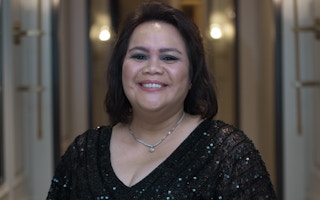Heading sustainability at the largest and oldest conglomerate in the Philippines is not easy, but Vickie Tan, who has steered Ayala’s journey in support of the United Nations’ Sustainable Development Goals (SDGs), is a force to be reckoned with.
To continue reading, subscribe to Eco‑Business.
There's something for everyone. We offer a range of subscription plans.
- Access our stories and receive our Insights Weekly newsletter with the free EB Member plan.
- Unlock unlimited access to our content and archive with EB Circle.
- Publish your content with EB Premium.
Tan played a key role in bringing the different business units under the Ayala Corporation, including premiere property developer Ayala Land, the country’s oldest bank, Bank of the Philippine Islands, water provider Manila Water, and telecoms company Globe Telecoms, together to create the Ayala Sustainability Blueprint, which was launched in April this year.
The blueprint will guide the corporation in addressing critical environmental, social and governance (ESG) gaps in the Philippines and sets actionable targets to generate more significant and lasting impact through Ayala’s businesses.
Due to her drive and passion to integrate sustainability in her company and make it mainstream in the Philippines, Tan was selected as one of the nine chief sustainability officers in the Eco-Business A-List, a who’s who of the most influential corporate sustainability executives in Asia Pacific.
“
I am always hopeful, otherwise, I wouldn’t be in this job.
In this interview with Eco-Business, Tan shares the biggest question sustainability executives should be asking themselves this year, her unsustainable guilty pleasures, and the sustainability buzzword she can live without.
What’s the most important thing you’ve done this year?
Continuously integrate risk management and sustainability and make the business case for aligning our strategies with the SDGs, because I think that is the best way to future-proof the business.
How are you creating this awareness and reaching out to others?
I talk about integrating risk management and sustainability at every opportunity I get, be it in the Philippines or across the region. When I was invited to present at the Pan-Asia Risk and Insurance Management Association (PARIMA) what we were doing in Ayala, the audience realised that aligning the business with the SDGs is not merely about Corporate Social Responsibility (CSR) or a public relations drive, but that it works as a whole business model.
What is the biggest question that sustainability executives should be asking themselves this year?
Have you integrated ESG risk factors into your investment criteria?
What is the most effective way to persuade your CEO to take sustainability seriously? And maybe we could expand that question—what’s the most effective way for other CSOs to convince their own CEOs to take sustainability seriously?
Based on my personal experience, it’s the other way around. My chairman and CEO, Jaime Augusto Zobel de Ayala, continuously inspires me to take on the sustainability role, not just reporting (for compliance) but how to embed sustainability in the business strategy. How will I convince the other CEOs of the value of sustainability? I will ask my chairman to talk to them.
Nobody’s perfect, not even sustainability executives. What is your unsustainable guilty pleasure?
Eating meat. As sustainability executives we should be consuming less.
I’m guilty also of this—fast fashion. I think that is one of the things that I really have to deal with personally. Commercialism is driving us to shop, shop, shop. We should change that. We need to be more conscious of what we’re buying, and ask ourselves if we’re buying from sustainable sources.
Why will you never be replaced by a robot?
Because I have a heart and a robot does not. Probably they will be more intelligent than us eventually, but as for empathy, love, and care; I don’t think they can replace these very human traits.
Which sustainability buzz word could you live without?
I can live without “material issues” [defined as any attribute or factor that is relevant and substantial to the overall performance, results and viability of a business.] Actually there’s a lot of confusion about which issues are material for business, but for me the best way to define material issues is to determine which issues are most important to your stakeholders.
The Intergovernmental Panel on Climate Change’s 11-year climate deadline to reduce emissions to avoid the worst consequences of climate change. Will we make it, or are we doomed?
I am always hopeful, otherwise, I wouldn’t be in this job. According to the latest IPCC report, if I interpreted it right, there are ways that we can achieve a 1.5 degrees Celsius limit to global warming such as reducing our dependence on fossil fuel-based energy and adopting cleaner energy, changing our mindsets about car ownership and taking public transport, cycling, or walking more, and watching our consumption habits so that we only consume what we need. So let’s stay hopeful, just be more conscious of how we contribute to carbon emissions.
It can be done. I always think of my children; they are the strongest drivers of my desire to respond to the climate emergency and ensure that they have a future.
Vickie Tan was one of nine sustainability executives selected for the EB A-List this year. Read our other interviews with the A-Listers here.
Eco-Business will be calling for nominations for the 2020 A-List next September. Do you know a corporate sustainability leader who has really moved the needle for their business and industry? Bear them in mind for our next call for nominations.














